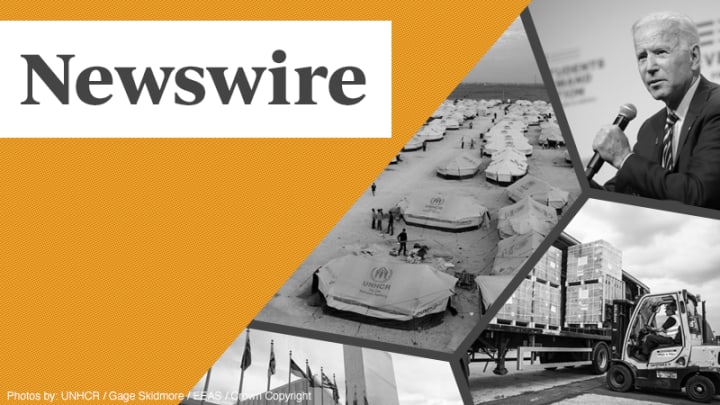
HAPPENING SOON: At 10 a.m. ET (4 p.m. CET), Raj Kumar joins Carnegie’s Steven Feldstein for a conversation about the rise of digital tools in the hands of repressive governments. There’s still time to join the conversation.
This is a preview of Newswire
Sign up to this newsletter for an inside look at the biggest stories in global development, in your inbox daily.
U.S. President Joe Biden’s global vaccine distribution pledge hits logistical roadblocks, while African countries move one step closer to manufacturing their own doses.
South Africa will be the site of the first COVID-19 messenger-RNA vaccine technology transfer hub. The new facility will provide vaccine technology training to manufacturers from low- and middle-income countries, and license them for local production — but it is not likely to boost vaccine availability right away, Sara Jerving reports.
• “We just cannot continue to rely on vaccines that are made outside of Africa, because they never come. They never arrive on time and people continue to die,” says South African President Cyril Ramaphosa.
• If technological information for one of the existing mRNA COVID-19 vaccines is transferred to the South African hub, vaccines could be produced at the site in the next 9 to 12 months, says WHO Chief Scientist Dr. Soumya Swaminathan. If the technology transfer comes from a drug still in development, the timeline will be longer.
• To make that happen, the hub needs agreements with mRNA vaccine manufacturers — Pfizer and Moderna are the two proven safe and efficacious. A TRIPS waiver for intellectual property protections will also be critical to ensure there are no production hurdles.
Read: New mRNA tech transfer hub in South Africa aims to increase access
Meanwhile, a global south-led vaccine summit — which has been described as the polar opposite of the G-7 leaders’ meeting — concluded yesterday with commitments to collaborate on open licensing on COVID-19 vaccine technology, provide regulatory capacity support to countries in need, and pool manufacturing capacity for the production of COVID-19 vaccines and other medical equipment such as personal protective equipment and oxygen.
Open doors
On his first day in office, President Biden signed an executive order on advancing racial equity and support for underserved communities. That order directs federal agencies — including USAID — to review their policies and practices for potential barriers for people from different backgrounds and communities.
In a business call for 2021’s third quarter, USAID officials said that their goal “is to advance equity for underserved communities … not just internally … but also through our programs and partnerships.”
Get development’s most important headlines in your inbox every day.
Thanks for subscribing!
Devex Pro: Lisa Cornish outlines three areas the agency’s equity assessment will focus on, and what this might mean for procurement and country programs.
Bank shots
On Monday the World Bank struck a deal with the African Union that is meant to fast track the acquisition of Johnson & Johnson single-shot vaccine doses on the open market, Shabtai Gold reports.
• The funding will come from the bank’s previously announced pool of $12 billion for COVID-19 vaccine purchasing and delivery.
• Vaccines will be purchased by the African Vaccine Acquisition Task Team initiative, in an arrangement that is meant to complement COVAX.
• The agreement includes financing for both vaccine purchases and logistics as Africa continues to face a major vaccine access gap. It also follows criticism that the bank has not moved quickly enough to assist countries with vaccine purchases.
Read: World Bank-African Union deal to speed COVID-19 vaccine purchases
Follow-through
“What we’ve found to be the biggest challenge is not actually the supply — we have plenty of doses to share with the world — but this is a Herculean logistical challenge.”
— Jen Psaki, press secretary, The White House
The Biden administration is likely to fall short of its goal of shipping 80 million vaccine doses to other countries by the end of this month. On Monday, the White House outlined how the remaining 55 million doses will be allocated — with 75% going through COVAX and the rest “targeted to help deal with surges around the world.” At the G-7 earlier this month, Biden announced his plan to purchase 500 million vaccines from Pfizer to deliver internationally by next June.
Less is more
A report in The Guardian documenting complaints about the International Rescue Committee’s lack of progress on diversity, equality, and inclusion reforms also reignited some online chatter about NGO executive salaries. The article noted that IRC chief David Miliband’s salary package has now topped $1 million. Norwegian Refugee Council head Jan Egeland felt compelled to share that he makes much less.
In the news
Somalia, Congo, Afghanistan, and Syria top the list of the most dangerous conflict zones for children, the U.N. said Monday, accounting for nearly 60% of all violations. [VOA]
The EU has imposed new sanctions on officials in Myanmar over the military coup that overthrew the country’s elected government in February. [Reuters]
COVID-19 has caused global foreign direct investment to fall by one-third, which could threaten the fate of the Sustainable Development Goals according to a new report. [Al Jazeera]
Sign up to Newswire for an inside look at the biggest stories in global development.
Printing articles to share with others is a breach of our terms and conditions and copyright policy. Please use the sharing options on the left side of the article. Devex Pro subscribers may share up to 10 articles per month using the Pro share tool ( ).
from WordPress https://ift.tt/2SlCClV
via IFTTT

No comments:
Post a Comment